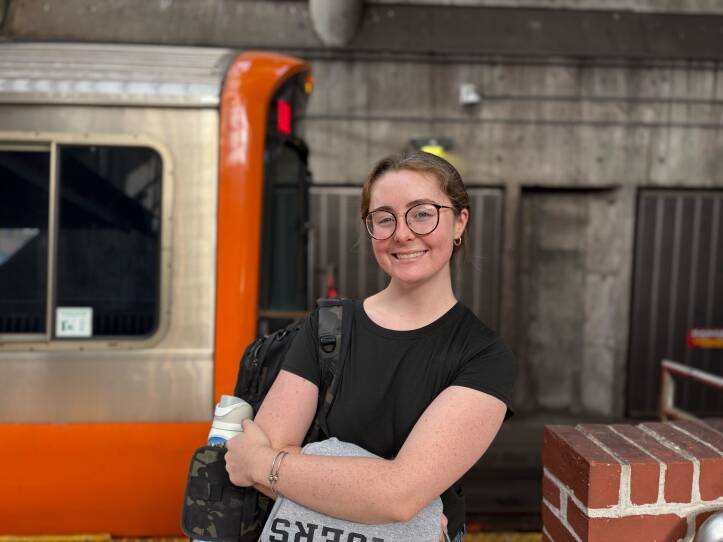The MBTA ramping up its efforts to crack down on people taking the train for free.
The transit agency deployed “fare engagement representatives” at subway stops around its system Monday morning. Clad in bright blue shirts, khaki pants and MBTA caps, they’re hard to miss. You may have seen them around already, in fact, since they began working in stations last fall when the agency launched its education campaign about fare evasion. Now, these representatives will begin enforcing payment.
According to the transit agency, a rider who is caught not paying their fare will first receive a warning. After that, a rider will receive a $50 fine for subsequent offenses. If a rider accumulates three citations within a period of three years, additional citations will increase to $100.
For the T, the justification is simple: The agency is losing millions of dollars a year on unpaid rides, and fare enforcement will help it stay financially afloat. But for riders, feelings are more complicated, if not purely oppositional.
“I think it’s stupid,” said Paul Holding. “People pay taxes, and it should just be free.”
There were no fare engagement representatives at the Massachusetts Avenue station Monday morning, but Holding said if one were to stop him in an attempt to get his information or issue a fine, he would ignore them.
“I’d just keep on walking,” he said. “Not gonna lie.”
Several riders who slipped through gates on Monday told GBH News they plan to keep evading fares, at least until they’re caught.
Other riders were more understanding. Katie Lynch, who uses the Orange Line to travel to North Station for work, said she gets that the T needs fare revenue but wishes the agency were using its resources on maintenance to prevent shutdowns, rather than fare enforcement.
“If there are all sorts of delays and shuttles happening, I don’t think it’s valid for them to be enforcing that,” she said. “Why should I have to pay if I have to take a shuttle and it makes me 20 minutes late? But I do understand they can’t fix things if people don’t pay and they don’t have the funds to do it.”

According to MBTA General Manager Phil Eng, the enforcement effort is necessary to help fund the T’s increasing maintenance and operating costs. “The truth is, fare revenue is a vital part of how we operate,” he said in a video announcing the initiative. “When people don’t pay their fares, it impacts all of us. It slows down the progress we’ve worked so hard to achieve.”
An MBTA analysis of fare evasion from 2021 estimated that the system lost between $5 million and $6 million in annual revenue due to unpaid fares on subways, trolleys and buses. The same presentation projected that the agency lost an additional $10 million to $20 million on the Commuter Rail due to fare evasion.
The agency began training its team of 16 fare engagement representatives in October 2024. During the first several weeks of those workers being on the ground, the T said, fare collection increased by up to 35% at stations where representatives were on-site.
The agency said it will begin enforcing fares on buses, the Green Line and the Mattapan Trolley in a future phase of its enforcement program. The agency did not answer questions about when that next phase begins.





